Amaryllis plants are popular during the winter holiday season. They’re sometimes given as gifts or pet parents buy and force the amaryllis bulbs themselves. The result is a tall plant with large, showy flowers! Amaryllis are beautiful; however, what happens if a dog eats an amaryllis bulb?
Connect with a verified veterinarian in minutes. Licensed vets are available 24/7 to answer your questions. No need to worry about your furry family member.
Has your dog eaten an amaryllis bulb? Are you worried the amaryllis bulb will make your dog sick? If so, you’ve come to the right place. We understand it can be scary when your dog eats something like this.
We’ve gathered information about the amaryllis bulb and whether it can make a dog sick. Let’s get started!

What is an Amaryllis Bulb?
An amaryllis bulb is a bulb that produces a large plant that has beautiful, large flowers. Pet parents may get these bulbs in bags or boxes with the idea of forcing the bulbs to produce a plant by the holidays. However, it’s possible that a dog could find the bulbs and be curious enough to eat one!
But what happens if a dog eats an amaryllis bulb? Can the amaryllis bulb make a dog sick?
Amaryllis Bulbs & Dogs
Unfortunately, amaryllis bulbs are toxic to dogs. The bulbs contain lycorine, which is poisonous to dogs. While lycorine is found in all parts of the amaryllis plant, the bulbs contain larger amounts of this toxin.
It may be that your canine companion has only eaten one bulb; however, if you have a bag or box of bulbs (or bulbs in the garden), it’s possible he’s eaten several bulbs.

Review symptoms, medications & behavior to keep your pets healthy with a Vet Online in just minutes.
Ask a Vet Live NowSymptoms of Amaryllis Bulb Ingestion in Dogs
You may notice these symptoms if your dog eats an amaryllis bulb:
- Drooling
- Nausea
- Vomiting
- Diarrhea
- Depression
- Abdominal pain or discomfort
- Low blood pressure
- Respiratory problems
If you notice these symptoms in your dog, call the vet immediately. This is an emergency.
Treatment of Amaryllis Bulb Ingestion in Dogs
The vet may try to induce vomiting and use activated charcoal. These methods remove the toxin from your dog’s system. In addition, the vet may treat your dog with IV fluids, which also work to flush toxins out of your dog’s body.
The vet will great other symptoms as they arise. For instance, they may give your fur baby pain medication, gastroprotectants, and other treatments.
The prognosis is best for dogs who receive prompt medical treatment after eating amaryllis bulbs. Even so, most dogs who eat amaryllis bulbs will make a fully recovery.
In the future, it’s a good idea to keep amaryllis bulbs and other plants out of your dog’s reach. You’ll both be happier for it!
Connect with a verified veterinarian in minutes. Licensed vets are available 24/7 to answer your questions. No need to worry about your furry family member.

Julie
Julie is a graduate of the University of North Carolina, Wilmington, where she studied Animal science. Though contrary to the opinion of her parents she was meant to study pharmacy, but she was in love with animals especially cats. Julie currently works in an animal research institute (NGO) in California and loves spending quality time with her little cat. She has the passion for making research about animals, how they survive, their way of life among others and publishes it. Julie is also happily married with two kids.
Review symptoms, medications & behavior to keep your pets healthy with a Vet Online in just minutes.
Ask a Vet Live Now




